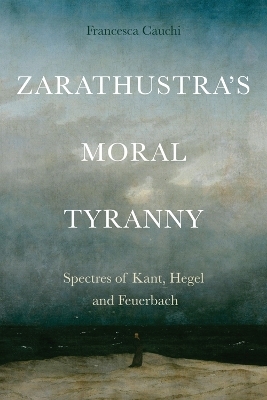
Zarathustra'S Moral Tyranny
Spectres of Kant, Hegel and Feuerbach
Seiten
2022
Edinburgh University Press (Verlag)
978-1-3995-0431-7 (ISBN)
Edinburgh University Press (Verlag)
978-1-3995-0431-7 (ISBN)
In this reading of Nietzsche's most elusive work, Francesca Cauchi claims that Thus Spoke Zarathustra is a moral polemic, one grounded in its own set of moral values that posits its own moral goal - the self-overcoming of Christian morality through the creation of new values.
Presents Nietzsche's Zarathustra as a moral tyrant whose ethics are more exacting than the Christian morals they are intended to supplant
Identifies and critiques the four key strands of Nietzsche's ethics of self-overcoming
Unmasks the 'moralism' behind Nietzsche's self-professed 'immoralism'
Furthers research on the intellectual parallels between Nietzsche and Kant and between Nietzsche and Hegel
The first critical work to discern affinities between Nietzsche and Feuerbach on the subject of love, sacrifice and a higher humanity
By way of a sustained interrogation of Zarathustra's doctrine of self-overcoming, Francesca Cauchi lays bare the asceticism underlying the prescriptive injunctions set forth in the first two parts of Thus Spoke Zarathustra. These injunctions fall under three heads: self-legislation, self-denial and self-sacrifice, which are shown to bear striking affinities with concepts first formulated by Kant, Hegel and Feuerbach, respectively. In Cauchi's new reading, the Kantian rational will, the Hegelian 'labour of the negative' and Feuerbach's indivisible trinity of love, sacrifice and suffering are seen to resurface in Zarathustra as the agents of a ferocious and self-eviscerating doctrine of self-overcoming that exhibits all the attributes of a moral tyranny.
Presents Nietzsche's Zarathustra as a moral tyrant whose ethics are more exacting than the Christian morals they are intended to supplant
Identifies and critiques the four key strands of Nietzsche's ethics of self-overcoming
Unmasks the 'moralism' behind Nietzsche's self-professed 'immoralism'
Furthers research on the intellectual parallels between Nietzsche and Kant and between Nietzsche and Hegel
The first critical work to discern affinities between Nietzsche and Feuerbach on the subject of love, sacrifice and a higher humanity
By way of a sustained interrogation of Zarathustra's doctrine of self-overcoming, Francesca Cauchi lays bare the asceticism underlying the prescriptive injunctions set forth in the first two parts of Thus Spoke Zarathustra. These injunctions fall under three heads: self-legislation, self-denial and self-sacrifice, which are shown to bear striking affinities with concepts first formulated by Kant, Hegel and Feuerbach, respectively. In Cauchi's new reading, the Kantian rational will, the Hegelian 'labour of the negative' and Feuerbach's indivisible trinity of love, sacrifice and suffering are seen to resurface in Zarathustra as the agents of a ferocious and self-eviscerating doctrine of self-overcoming that exhibits all the attributes of a moral tyranny.
Francesca Cauchi is an Associate Professor National Sun Yat-sen University in Kaohsiung, Taiwan. She is the author of Zarathustra contra Zarathustra: The Tragic Buffoon (Ashgate, 1998), reissued under the Routledge imprint in September 2018. She has published many articles in peer-review journals including Philological Quarterly, Journal of European Studies and Oxford German Studies.
| Erscheinungsdatum | 30.11.2022 |
|---|---|
| Verlagsort | Edinburgh |
| Sprache | englisch |
| Maße | 138 x 216 mm |
| Themenwelt | Geisteswissenschaften ► Philosophie ► Ethik |
| ISBN-10 | 1-3995-0431-2 / 1399504312 |
| ISBN-13 | 978-1-3995-0431-7 / 9781399504317 |
| Zustand | Neuware |
| Haben Sie eine Frage zum Produkt? |
Mehr entdecken
aus dem Bereich
aus dem Bereich
unsere kollektive Verantwortung
Buch | Hardcover (2023)
wbg Theiss in Wissenschaftliche Buchgesellschaft (WBG) (Verlag)
35,00 €


